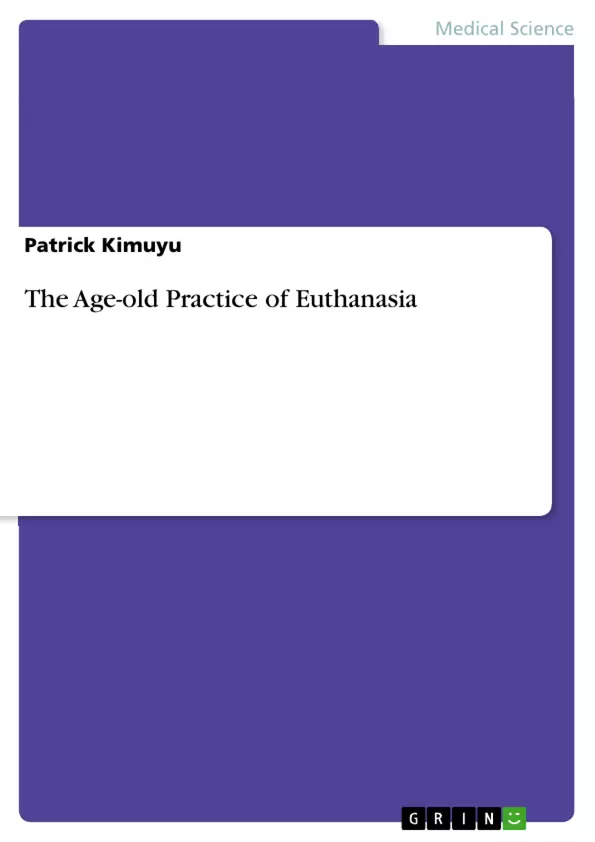Euthanasia is commonly known as mercy killing or assisted suicide because the involved procedures are designed in such a way that, the patient’s dignity is not degraded or compromised. Euthanasia has aroused unprecedented debate in the society because it involves several considerations; the most significant one’s being practical, religious and ethical issues. Moreover, this practice seems to be somehow challenging to the health professionals, since it is not in alignment with the medical ethics nor legal framework. Euthanasia is illegal in the United Kingdom: thus, it is considered illegal. Therefore, approaches towards euthanasia require caution, since it can lead to imprisonment (Nicholson, 2000). For instance, voluntary euthanasia is considered as a crime in the United Kingdom, which is punishable by law. Any individual who deliberately executes euthanasia is subjected to serve a jail term. Therefore, this research paper will give an overview of euthanasia. Euthanasia has evoked unprecedented controversy in the society.
Inhaltsverzeichnis (Table of Contents)
- Introduction
- Forms of Euthanasia
- Active Euthanasia
- Passive Euthanasia
- Voluntary Euthanasia
- Involuntary Euthanasia
- Indirect Euthanasia
- Assisted Euthanasia
- Euthanasia Ethics
- Arguments for Euthanasia
- Arguments against Euthanasia
- Euthanasia and Religion
- Legislation on Euthanasia
Zielsetzung und Themenschwerpunkte (Objectives and Key Themes)
This research paper provides a comprehensive overview of euthanasia, exploring its various forms, ethical considerations, arguments for and against the practice, and its relationship with religion and legislation.
- Different forms of euthanasia, including active, passive, voluntary, involuntary, indirect, and assisted euthanasia.
- The ethical debate surrounding euthanasia, including arguments based on individual autonomy, medical ethics, and religious perspectives.
- Arguments for and against euthanasia, encompassing practical, philosophical, and medical perspectives.
- The role of religion in the euthanasia debate, with a focus on Christian, Islamic, and Hindu perspectives.
- The current state of legislation regarding euthanasia, with examples from the United Kingdom and the Netherlands.
Zusammenfassung der Kapitel (Chapter Summaries)
The introduction defines euthanasia and explores its historical origins and the various ethical and legal complexities surrounding the practice. It highlights the controversial nature of euthanasia and its implications for healthcare professionals and society as a whole.
The chapter on forms of euthanasia delves into various classifications, such as active, passive, voluntary, involuntary, indirect, and assisted euthanasia, providing a detailed explanation of each form and its underlying principles.
The chapter on euthanasia ethics explores the moral dilemmas and philosophical arguments surrounding the practice. It discusses the tension between individual autonomy and societal values, and the ethical implications for both patients and healthcare providers.
The chapter on arguments for euthanasia examines various perspectives supporting the practice, including libertarian arguments emphasizing individual choice and utilitarian arguments emphasizing the maximization of societal well-being.
The chapter on arguments against euthanasia presents diverse viewpoints opposing the practice, including concerns about the devaluation of life, potential for abuse, and the impact on medical ethics.
The chapter on euthanasia and religion explores the perspectives of major religious traditions on the issue, highlighting their views on the sanctity of life, the role of God, and the ethical implications of euthanasia.
The chapter on legislation on euthanasia discusses the current legal landscape regarding euthanasia in different countries, including the United Kingdom and the Netherlands, exploring different approaches to regulation and the ongoing debate surrounding legal frameworks.
Schlüsselwörter (Keywords)
The main keywords and focus topics of the text are euthanasia, mercy killing, assisted suicide, active euthanasia, passive euthanasia, voluntary euthanasia, involuntary euthanasia, indirect euthanasia, assisted euthanasia, ethics, morality, religion, legislation, individual autonomy, societal values, medical ethics, healthcare professionals, and legal frameworks.
Frequently Asked Questions
What is the difference between active and passive euthanasia?
Active euthanasia involves a deliberate act to end a patient's life (e.g., lethal injection), while passive euthanasia involves withholding life-sustaining treatment.
Is euthanasia legal in the United Kingdom?
No, euthanasia and assisted suicide are currently illegal in the UK and can lead to imprisonment for those who execute it.
What are the main religious views on euthanasia?
Most major religions (Christianity, Islam, Hinduism) emphasize the sanctity of life and generally oppose euthanasia, seeing God as the only one with authority over life and death.
What is 'voluntary' vs 'involuntary' euthanasia?
Voluntary euthanasia is performed at the request of the patient, whereas involuntary euthanasia is performed without the patient's explicit consent (e.g., if they are unconscious).
What are the common arguments for euthanasia?
Arguments often center on individual autonomy, the right to die with dignity, and the relief of unbearable suffering.
- Arbeit zitieren
- Patrick Kimuyu (Autor:in), 2018, The Age-old Practice of Euthanasia, München, GRIN Verlag, https://www.hausarbeiten.de/document/418711


